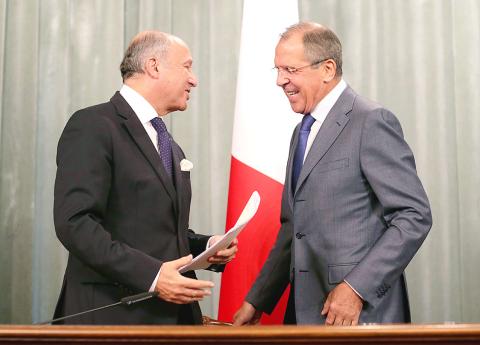Russia and France admitted yesterday they still had differences over how to solve the Syrian conflict ahead of a debate in the UN Security Council over stripping the country of its chemical arsenal.
After meeting in Moscow, Russian Foreign Minister Sergei Lavrov and French Minister of Foreign and European Affairs Laurent Fabius said they had differing visions of how to proceed toward the common goal of a peaceful and chemical weapons-free Syria.
Russia also strongly rejected claims by both France and the US that a UN report released on a sarin attack outside Damascus on Aug. 21 placed the blame with the Syrian government.

Photo: EPA
Despite sharing the same goal of destroying Syria’s weapons and holding an eventual peace conference, “we have differences over how to achieve it,” Lavrov said.
He added that the UN report “proves that chemical weapons were used,” but does not prove that the regime of Syrian President Bashar al-Assad was behind it.
“There is still no answer to the question of where the missile [used in the August 21 attack] was produced,” he said.
There is still a “most serious basis to believe that this was a provocation,” Lavrov said of the attack, calling on world powers not to “play up emotions” when making decisions, but rather “rely on professionals.”
However, Fabius said that the UN report left “no doubt that the Damascus regime was responsible” for the chemical attack.
He said there was a “difference in approach” between France and Russia on the methods required to reach peace, but the two sides were “perfectly agreed” on the need for a political solution.
Lavrov and Fabius met in Moscow a day after France, the US and the UK said they will push for a strong resolution.
Diplomats said France and the UK are preparing a draft that will demand a threat of sanctions if al-Assad does not comply with the chemical disarmament plan.
Lavrov stressed that the agreement he reached with US Secretary of State John Kerry on Saturday meant that the opposition will also be responsible for compliance and that the resolution will not be under the chapter of the UN charter that allows the use of force.
The report by UN experts released on Monday said the attack used sarin gas delivered by surface-to-surface rockets, but did not assign blame to either side.
China, which has voted together with Russia in the past against UN Security Council resolutions spelling out intervention or sanctions in Syria, said yesterday it would be taking a “serious look” at the UN report.

Taiwan is projected to lose a working-age population of about 6.67 million people in two waves of retirement in the coming years, as the nation confronts accelerating demographic decline and a shortage of younger workers to take their place, the Ministry of the Interior said. Taiwan experienced its largest baby boom between 1958 and 1966, when the population grew by 3.78 million, followed by a second surge of 2.89 million between 1976 and 1982, ministry data showed. In 2023, the first of those baby boom generations — those born in the late 1950s and early 1960s — began to enter retirement, triggering

ECONOMIC BOOST: Should the more than 23 million people eligible for the NT$10,000 handouts spend them the same way as in 2023, GDP could rise 0.5 percent, an official said Universal cash handouts of NT$10,000 (US$330) are to be disbursed late next month at the earliest — including to permanent residents and foreign residents married to Taiwanese — pending legislative approval, the Ministry of Finance said yesterday. The Executive Yuan yesterday approved the Special Act for Strengthening Economic, Social and National Security Resilience in Response to International Circumstances (因應國際情勢強化經濟社會及民生國安韌性特別條例). The NT$550 billion special budget includes NT$236 billion for the cash handouts, plus an additional NT$20 billion set aside as reserve funds, expected to be used to support industries. Handouts might begin one month after the bill is promulgated and would be completed within

NO CHANGE: The TRA makes clear that the US does not consider the status of Taiwan to have been determined by WWII-era documents, a former AIT deputy director said The American Institute in Taiwan’s (AIT) comments that World War-II era documents do not determine Taiwan’s political status accurately conveyed the US’ stance, the US Department of State said. An AIT spokesperson on Saturday said that a Chinese official mischaracterized World War II-era documents as stating that Taiwan was ceded to the China. The remarks from the US’ de facto embassy in Taiwan drew criticism from the Ma Ying-jeou Foundation, whose director said the comments put Taiwan in danger. The Chinese-language United Daily News yesterday reported that a US State Department spokesperson confirmed the AIT’s position. They added that the US would continue to

IMPORTANT BACKER: China seeks to expel US influence from the Indo-Pacific region and supplant Washington as the global leader, MAC Minister Chiu Chui-cheng said China is preparing for war to seize Taiwan, Mainland Affairs Council (MAC) Minister Chiu Chui-cheng (邱垂正) said in Washington on Friday, warning that Taiwan’s fall would trigger a regional “domino effect” endangering US security. In a speech titled “Maintaining the Peaceful and Stable Status Quo Across the Taiwan Strait is in Line with the Shared Interests of Taiwan and the United States,” Chiu said Taiwan’s strategic importance is “closely tied” to US interests. Geopolitically, Taiwan sits in a “core position” in the first island chain — an arc stretching from Japan, through Taiwan and the Philippines, to Borneo, which is shared by